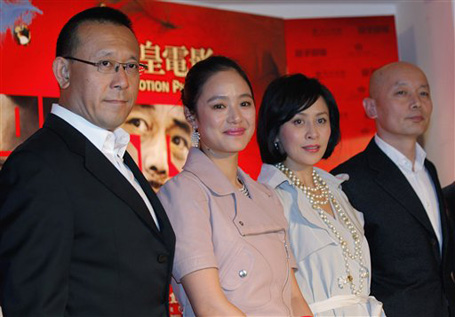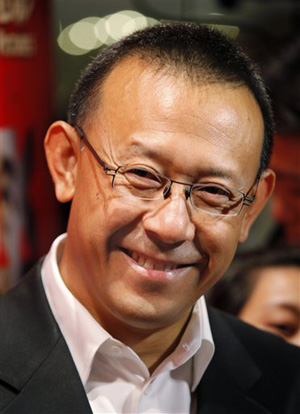Jiang Wen’s latest film has earned rare box-office success in the sensitive genre of Chinese political satire, but theories are flying that it accomplishes much more: eluding strict censorship to criticize China’s current government.
Set in the chaotic years after the collapse of imperial rule, Let the Bullets Fly tells the story of a Robin Hood-like bandit who kidnaps a con man about to take up the mayorship he secured through bribes. The bandit swaps identities with his hostage and becomes mayor, only to find himself locked in a battle of wits against a corrupt businessman who made his fortune from tobacco and human trafficking.
Movie critics, however, say there is more than meets the eye. Are the con man and businessman symbols of corrupt Chinese officials who have secretly pocketed the fruits of the country’s capitalist-style economic reforms? Is the bandit, who is played by Jiang himself, the brave crusader who dares take on the status quo?

In this photo taken Monday, Jan. 10, 2011, Chinese actor-turned-director Jiang Wen appears at the premiere of his latest movie “Let the Bullets Fly” in Hong Kong. (AP Photo/Vincent Yu)
The con man travels in a train compartment pulled by horses. The word “horse” — pronounced “ma” in Chinese — is also used as Chinese shorthand for Marxism. Is the horse-pulled train a metaphor for China — a modernizing country driven by outdated ideology?
Jiang’s character says in the movie he wants to “earn money while standing upright” instead of kowtowing to authority. Is that Jiang the filmmaker speaking, saying he wants to make movies without censoring himself?
Jiang was coy when pressed about the hidden messages at the Hong Kong premiere of Let the Bullets Fly late Monday.
Asked by The Associated Press if his latest work was in fact a political criticism, the 48-year-old filmmaker said, “Whatever interpretation is fine. Whatever. You are welcome to think whatever you want to.”
He then jokingly chided a reporter for asking the question, saying, “You really lack imagination.”
Some fellow filmmakers say Jiang has pulled off an incredible feat by producing a commercial hit backed by the censors without sacrificing his artistic and personal integrity. Chinese directors known for their earlier, critical works — such as Zhang Yimou and Chen Kaige — have come under fire for gravitating toward apolitical historical and kung fu epics that don’t offend the government and meet growing market demand.
“Jiang Wen definitely put many of his personal beliefs in the movie. But he also managed a very successful balancing act between art and commerce,” said producer Chow Keung. “Seeing Jiang Wen succeed in this attempt is very encouraging to me.”
Chow is familiar with the Chinese censorship system, the Hong Kong native having served as the longtime producer for Jia Zhangke, the Golden Lion-winning director known for his films examining the Chinese working class. Jia spent years in the underground before his first movie was allowed to be released in 2004.
For all practical purposes, one can argue that Let the Bullets Fly is simply an entertaining action comedy. Besides Jiang, it stars Chow Yun-fat, the veteran Hong Kong actor made famous by John Woo’s stylish action thrillers, and Ge You, one of China’s biggest stars.
Producer Chow said many Chinese censors were trained at film schools and likely noticed Jiang’s subliminal messages — but turned a blind eye thinking they are too obscure for regular moviegoers.
The movie’s tremendous buzz may have the censors reconsidering. The State Administration of Radio, Film and Television ordered movie theaters to scale back screenings about a week after its Dec. 16 release, according to the China Digital Times, a U.S.-based website that monitors the Chinese media industry. That hasn’t curbed the movie’s box office success, which has reached more than 600 million Chinese yuan ($91 million).
Jiang, first known to Western audiences through his leading role in Zhang’s 1987 film Red Sorghum, is no stranger to censorship.
His 2000 film Devils on the Doorstep, which won the Grand Prize at the Cannes Film Festival, was banned in China. In an unpublished document that circulated in Beijing’s film community at the time, censors branded “Devils on the Doorstep” unpatriotic. The film portrays Chinese villagers who capture a wounded Japanese soldier near the end of World War II. They treat him well until deciding to trade him for food.


